备考2011高效学习方案英语高一册:unit 1 good friends
文档属性
| 名称 | 备考2011高效学习方案英语高一册:unit 1 good friends |
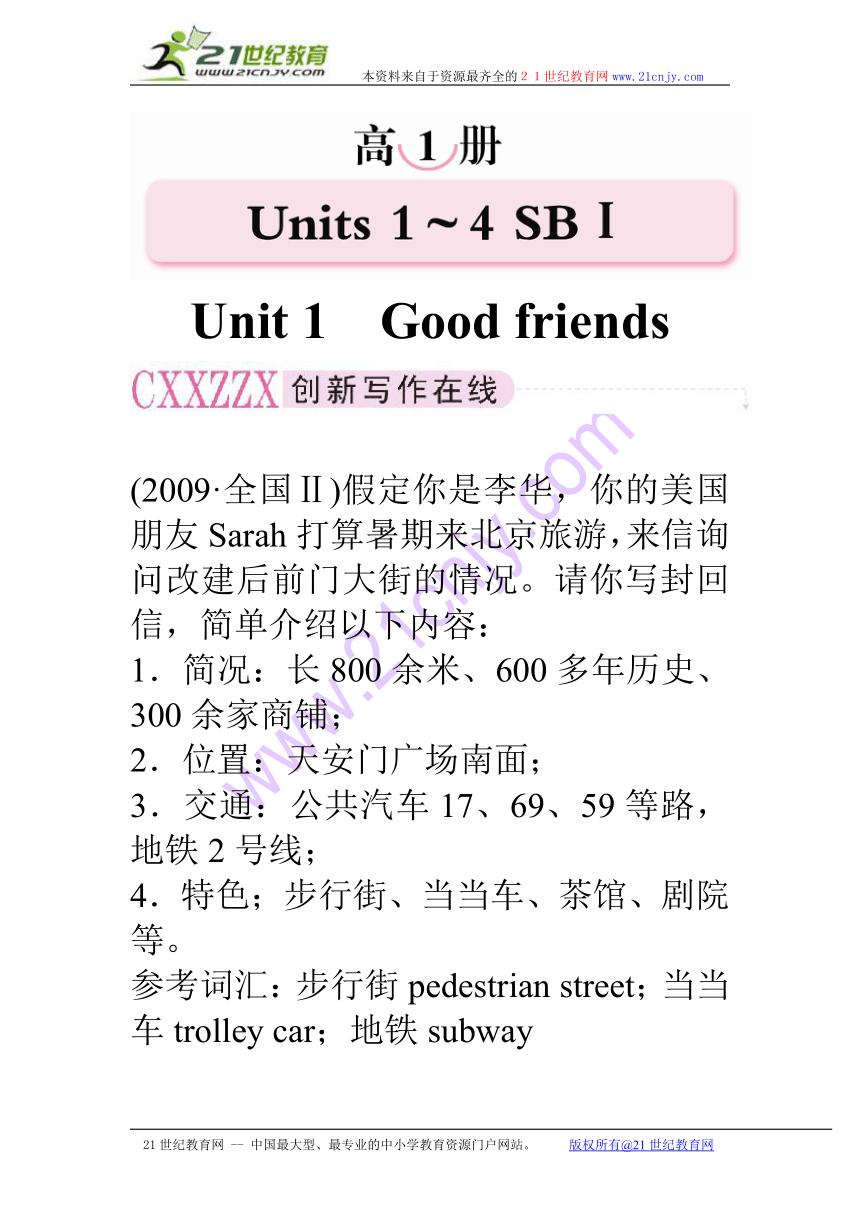
|
|
| 格式 | rar | ||
| 文件大小 | 196.6KB | ||
| 资源类型 | 教案 | ||
| 版本资源 | 人教版 | ||
| 科目 | 英语 | ||
| 更新时间 | 2010-12-14 00:00:00 | ||
图片预览

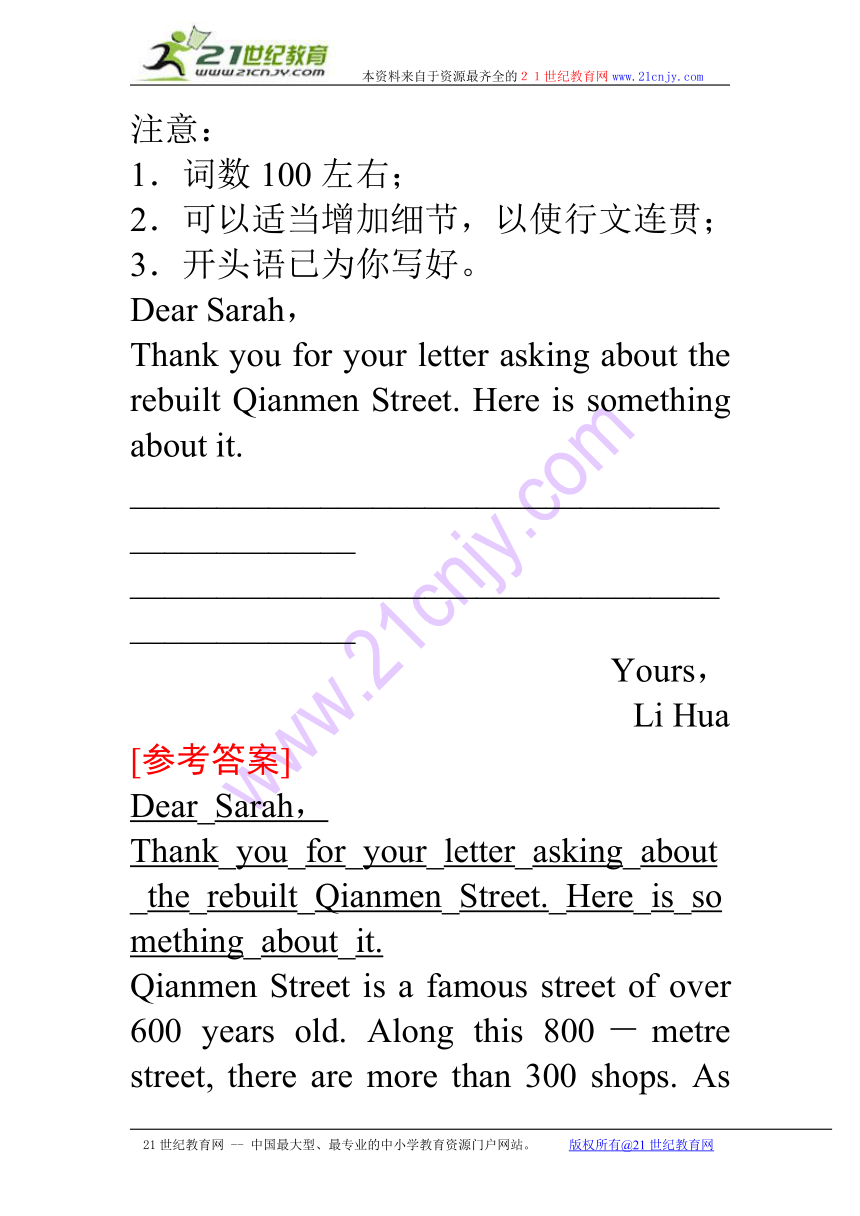
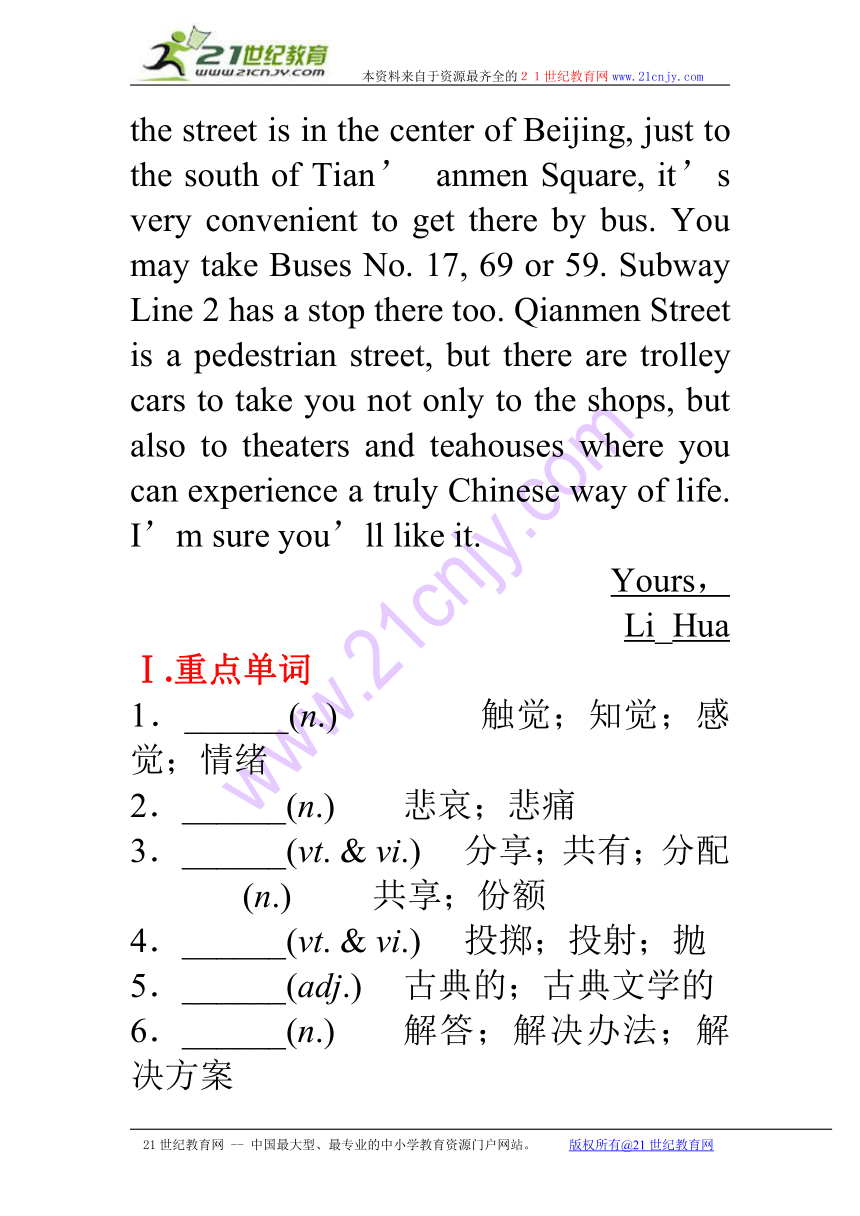
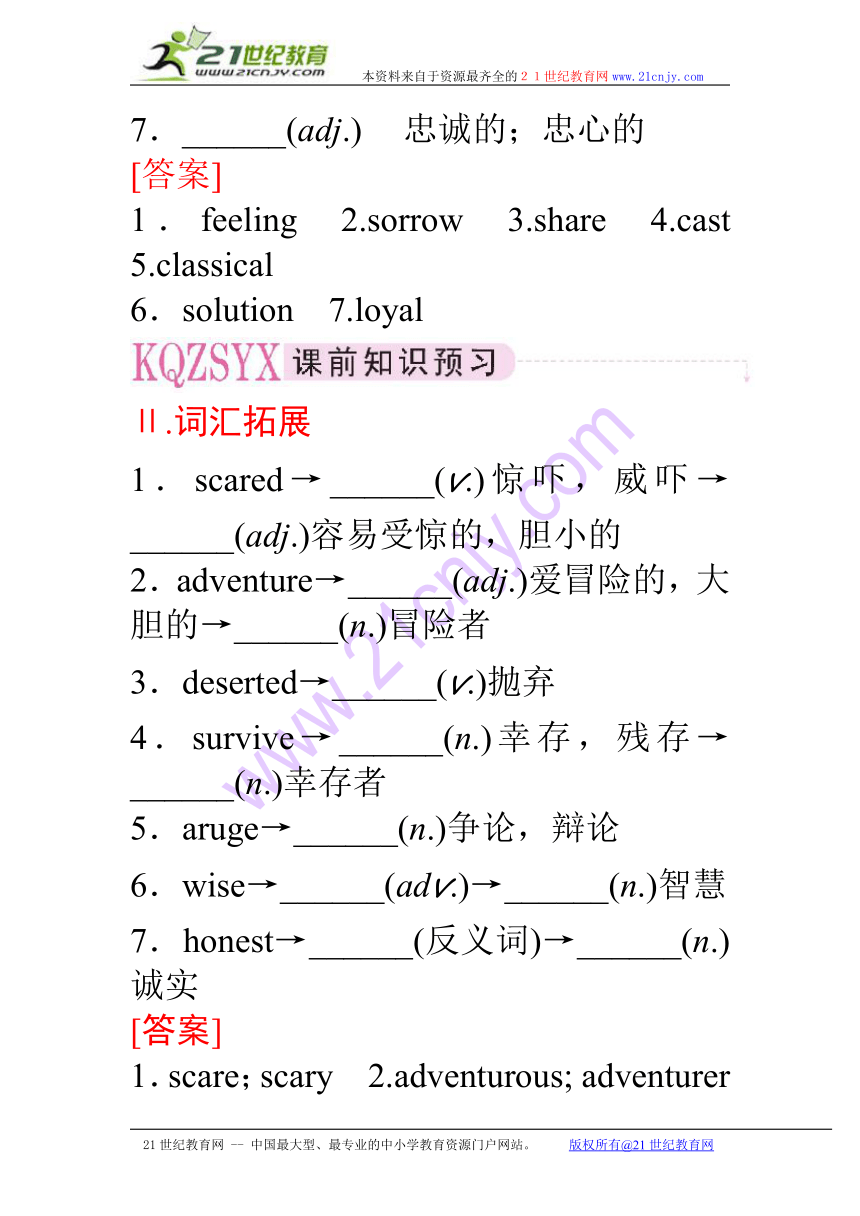
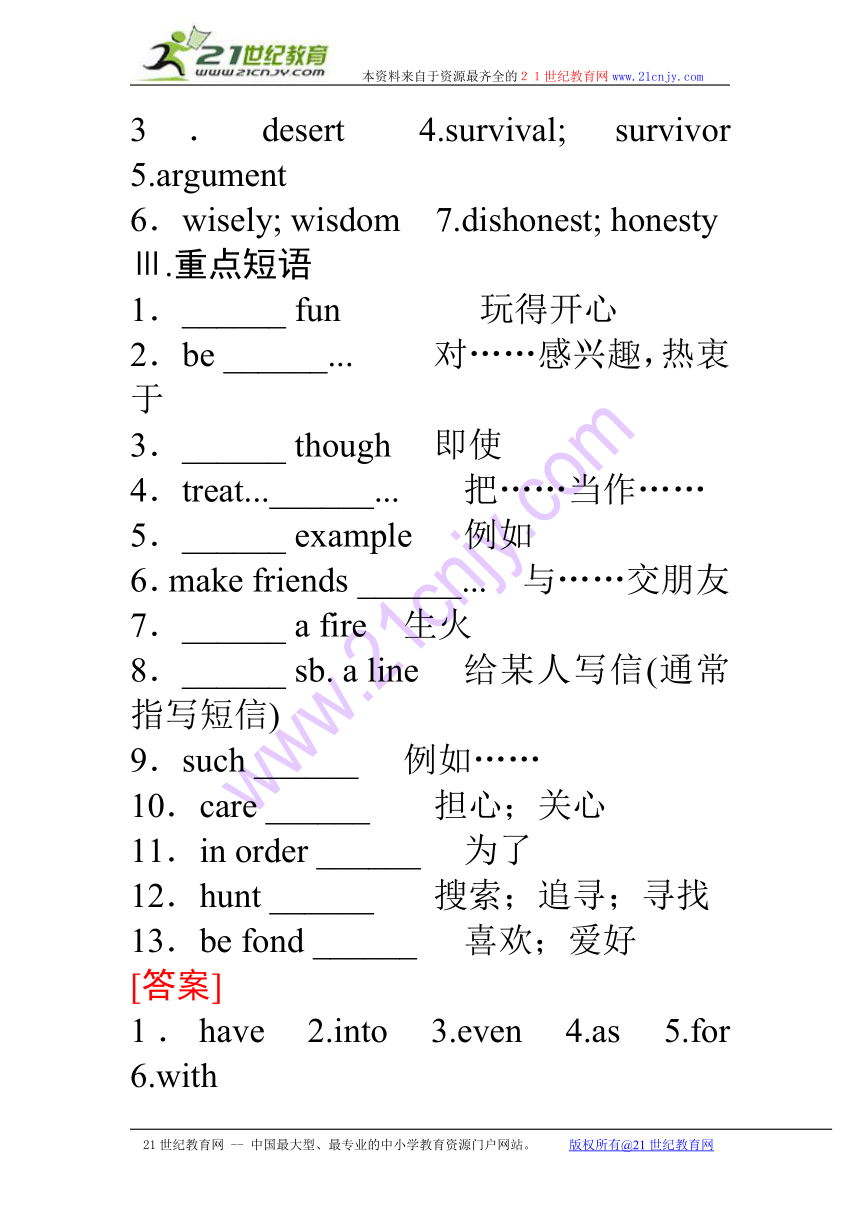
文档简介
本资料来自于资源最齐全的21世纪教育网www.21cnjy.com
Unit 1 Good friends
(2009·全国Ⅱ)假定你是李华,你的美国朋友Sarah打算暑期来北京旅游,来信询问改建后前门大街的情况。请你写封回信,简单介绍以下内容:
1.简况:长800余米、600多年历史、300余家商铺;
2.位置:天安门广场南面;
3.交通:公共汽车17、69、59等路,地铁2号线;
4.特色;步行街、当当车、茶馆、剧院等。
参考词汇:步行街pedestrian street;当当车trolley car;地铁subway
注意:
1.词数100左右;
2.可以适当增加细节,以使行文连贯;
3.开头语已为你写好。
Dear Sarah,
Thank you for your letter asking about the rebuilt Qianmen Street. Here is something about it.
_______________________________________________
_______________________________________________
Yours,
Li Hua
[参考答案]
Dear_Sarah,
Thank_you_for_your_letter_asking_about_the_rebuilt_Qianmen_Street._Here_is_something_about_it.
Qianmen Street is a famous street of over 600 years old. Along this 800-metre street, there are more than 300 shops. As the street is in the center of Beijing, just to the south of Tian’ anmen Square, it’s very convenient to get there by bus. You may take Buses No. 17, 69 or 59. Subway Line 2 has a stop there too. Qianmen Street is a pedestrian street, but there are trolley cars to take you not only to the shops, but also to theaters and teahouses where you can experience a truly Chinese way of life. I’m sure you’ll like it.
Yours,
Li_Hua
Ⅰ.重点单词
1.______(n.) 触觉;知觉;感觉;情绪
2.______(n.) 悲哀;悲痛
3.______(vt. & vi.) 分享;共有;分配
(n.) 共享;份额
4.______(vt. & vi.) 投掷;投射;抛
5.______(adj.) 古典的;古典文学的
6.______(n.) 解答;解决办法;解决方案
7.______(adj.) 忠诚的;忠心的
[答案]
1.feeling 2.sorrow 3.share 4.cast 5.classical
6.solution 7.loyal
Ⅱ.词汇拓展
1.scared→______(v.)惊吓,威吓→______(adj.)容易受惊的,胆小的
2.adventure→______(adj.)爱冒险的,大胆的→______(n.)冒险者
3.deserted→______(v.)抛弃
4.survive→______(n.)幸存,残存→______(n.)幸存者
5.aruge→______(n.)争论,辩论
6.wise→______(adv.)→______(n.)智慧
7.honest→______(反义词)→______(n.)诚实
[答案]
1.scare;scary 2.adventurous; adventurer
3.desert 4.survival; survivor 5.argument
6.wisely; wisdom 7.dishonest; honesty
Ⅲ.重点短语
1.______ fun 玩得开心
2.be ______... 对……感兴趣,热衷于
3.______ though 即使
4.treat...______... 把……当作……
5.______ example 例如
6.make friends ______... 与……交朋友
7.______ a fire 生火
8.______ sb. a line 给某人写信(通常指写短信)
9.such ______ 例如……
10.care ______ 担心;关心
11.in order ______ 为了
12.hunt ______ 搜索;追寻;寻找
13.be fond ______ 喜欢;爱好
[答案]
1.have 2.into 3.even 4.as 5.for 6.with
7.make 8.drop 9.as 10.about 11.to 12.for
13.of
Ⅳ.重点句型
1.What be+主语+like
……怎么样/如何?
2.I don’t enjoy singing, nor do I like computers.
我不喜欢唱歌,也不喜欢电脑。
3.Rock music is OK, and so is skiing.
摇滚乐不错,滑雪也同样如此。
Ⅴ.重点语法
Direct and Indirect Speech—Assertive sentence and Question
直接引语和间接引语——陈述句和疑问句
Ⅰ.词汇聚焦
1.argue vt. & vi. 辩论,争论
[思维拓展]
argue with sb. about/over sth.
与某人辩论某事
argue for为(支持……)而辩护
argue against辩驳
argue a matter out把某事辩个水落石出
argue sb. into/out of doing sth.
劝说某人做/不做某事
argument n. 辩论,理论
start/put forward an argument for/against
就赞成/反对……展开辩论
[指点迷津]
argue意为“争论,争辩”,重在就自己的看法、立场提出论证说理,以说服他人。
discuss意为“讨论”,重在交换意见,不含有说服对方的成分。
quarrel意为“争吵,吵架”,重在因生气或强烈的不满而同别人争吵,含有故意的成分。
Do what you are told and don’t ______ me.
A. argue B. argue with
C. quarrel D. discuss
解析:argue常用作不及物动词,用法同quarrel近似:argue/quarrel with sb. about/over sth.; discuss是及物动词,后面宾语一般是事,常用短语:discuss sth. (with sb.), discuss what to do或discuss wh...clause。不用于discuss sb.。
答案:B
2.fond adj. 喜爱的,喜欢的
[思维拓展]
“喜欢,爱好”的表达
be fond of+名词/代词/动名词
like+名词/代词/动名词/不定式
enjoy+名词/代词/动名词
be crazy about+名词/代词/动名词
would like+名词/代词/不定式
feel like+名词/代词/动名词
[指点迷津]
①like to do强调某一次具体的动作行为;like doing侧重普遍的习惯行为。
②fond只作表语,不能作定语,be也可以用get, become等连系动词代替,用以强调动作的意味。
3.match n. 比赛,对手;vt. 与……相匹配;较量
[思维拓展]
match for sb./sb.’s match与某人相匹敌者;对手
find/meet one’s match遇到对手
a match for the new hat与新帽子相配称之物
match sb./sth. with sb./sth.
找到能与某人/物相匹配的人/物
match sb./sth. against sb./sth.
使某人/物和他人/物竞争或较量
match up to sb./sth.与某人/物同样好或相当
[指点迷津]
match与game都可表示“比赛”,但“game”一词多用于美国英语中,且球类比赛如“football, baseball”等多用“game”。
You can’t ______ him in knowledge of wild plants.
A. watch B. catch
C. match D. keep
解析:根据“in knowledge of wild plants”“在野生植物的认识方面”可知题意为“(不能)与他相比”。
答案:C
4.honest adj. 诚实的
[思维拓展]
give an honest opinion提出坦诚的意见
an honest face一副诚实的面孔
make an honest living靠正当的收入生活
earn an honest penny以正当的手段凭努力工作挣钱
to be honest说实话(常用作独立状语)
dishonest adj. 不诚实的
honesty n. 诚实,正直
honestly adv. 的确;以正直的方式
[指点迷津]
honest作定语时,其前须用冠词an,如:an honest boy(一个诚实的男孩)。
______, I don’t think we have a chance of winning.
A. Be honestly B. To be honest
C. Honesty D. Being honest
解析:本句用“to be honest”作独立状语,相当于“honestly speaking”“说实话,坦白地说”,D项不符合语意。
答案:B
5.wise adj. 聪明的;明智的
[思维拓展]
wise“聪明的,有智慧的”可指人、言语、计划等,如:a wise person/plan一个明智的人/计划
smart机敏的,漂亮的,轻快的
如:a smart answer/idea巧妙的回答/主意
a smart hat漂亮的帽子
set off at a smart pace迈着轻快的步子
bright聪明的,伶俐的
clever“聪明的,伶俐的,机敏的”,应用范围广泛
如:a clever decision灵活的决定
clever hands巧手
I am surprised that you should have been fooled by such a(an) ______ trick.
A. ordinary B. easy
C. smart D. simple
解析:“ordinary”表示“普通的,一般的”,“easy”表示“容易的”,由“I am surprised”暗示,表示对方被“如此简单的花招”给愚弄了。
答案:D
6.cast vt. 投掷;扔 (cast, cast)
[思维拓展]
cast sb. as sb. else(戏剧中)选派某人担任角色
cast one’s eye over sb./sth.很快地看/查某人/物
cast sb./sth. aside抛弃或排除某人/物
cast sb. out把某人逐出
7.hunt v. & n. 搜索,打猎
[思维拓展]
on the hunt for sb./sth.在搜寻某人/物
a long hunt长时间的搜索
hunt for sb./sth.搜索某人/物
hunt sth. out将某物找出
go hunting进行狩猎活动
hunter n. 猎人
hunting n. 狩猎活动
I’ve ______ everywhere but I still can’t find my key.
A. hunted B. looked for
C. searched for D. found
解析:B、C两项后面须接宾语,“find”往往表示“找到”的结果。
答案:A
8.share n. 共享;份额;v. 分享;共有
[思维拓展]
get one’s fair share of sth.得到期望得到的数量
go shares with sb. in sth.与某人分享/分摊某物
share sth. (out) among/between sb.将某物平均分配
share sth. with sb.与某人分享某物/共有某物
share the joys and sorrows同甘共苦
Let Harry play with your toys as well, Clare—you must learn to ______.
A. support B. care
C. spare D. share
解析:support表示“支持,支撑”,care表示“关心,在乎”,spare表示“抽出(时间),匀出”,此处用share表示“分享,与……共用”,“……你必须学会与别人分享”。
答案:D
9.feeling n. 感觉;情绪
[指点迷津]
feeling作“感觉,预感”讲时,往往用作可数名词
a feeling of hunger/discomfort/joy饥饿/不适/快乐的感觉
a feeling of danger对危险的预感
作“知觉,情绪”讲时,往往用作不可数名词
lose feeling in one’s legs双腿失去知觉
feelings感情
hurt one’s feelings伤害某人的感情
Ⅱ.短语突破
1.such as 诸如,例如
[指点迷津]
①such as用于列举事物,其后直接跟被列举的内容,即as后不可加逗号。
此时such as常可换作like。
He knows several languages, such as English and French.
②for example用于举例,常作为插入语放于句中。其位置很灵活,可用于所举例子的前面或后面。
Some students come from the countryside—John for example.
He has just bought quite a few good books, ______ The Scarlet Letter; Wuthering Heights.
A. such as B. for example
C. that is D. which are
解析:根据题意以及句法结构可知,该句应使用such as表示“诸如……,像……”,用于列举。
答案:A
2.be into sth. 喜欢某事物
[思维拓展]
break/burst into闯入
look into调查
cut...into pieces把……切成块
divide...into把……分成……
run/knock into sb./sth.撞到某人/某物
deep into night深夜
come into power上台,掌权
3.too much 太多
[思维拓展]
too much+不可数名词
much too+adj./adv.
be too much for对……来说太困难/太过分
Climbing the stairs is too much for her now.
上楼梯现在对她来说是太难了。
Your words are too much for her.
对她而言你的话说得太重了。
[指点迷津]
在much too中too是副词,后面可接adj.或adv., much也可以用a little, a bit, rather, a lot, far等替换,表示不同的程度。如:
The soup is a little/bit too salty for me.
The weather is far/much too cold today.
She’s rather too sure of herself.
Allen had to call a taxi because the box was ______ to carry all the way home.
A. much too heavy B. too much heavy
C. heavy too much D. too heavy much
解析:too much+不可数名词;much too+adj./adv.; heavy为形容词,故应为much too heavy。
答案:A
3.treat...as... 把……当……对待
He talks to him and treats him as a friend.
他与他交谈,把他视为朋友。
[思维拓展]
treat a patient治疗病人
treat sb. to dinner请某人吃饭
It’s my treat.我来请客。
consider sb./sth. as sth.视某人/某物为……
regard sb. as sb.将某人看作……
think of sb./sth. as sb./sth.将某人/某事物看作某人/某事物
4.in order to 为了……
[思维拓展]
in order to do“为了做……”,在句中引导目的状语,可位于句首或句中,其否定形式为in order not to do;有时也直接用to do作目的状语。
[指点迷津]
①so as to也常用于引导目的状语,但一般不位于句首;否定式so as not to do。
②二者都可转换成由so that/in order that引导的目的状语从句。此时从句中须加情态动词can, could, may, might等。
Helen had to shout ______ above the sound of the music.
A. making herself hear
B. to make herself hear
C. making herself heard
D. to make herself heard
解析:该题用不定式to make短语表达“不得不喊”的目的,可排除A、C项。above the sound of the music为介词短语,不能作hear的宾语,排除B项。
答案:D
All these gifts must be mailed immediately ____ in time for Christmas.
A. in order to have received
B. in order to receive
C. so as to be received
D. so as to be receiving
解析:句子主语all these gifts与不定式receive构成被动关系,故用in order to/so as to be received。
答案:C
5.care about 关心;担心
[指点迷津]
①care about表示由于认为某事重要而产生兴趣或关心,“对……关心,焦虑”,多用于疑问句和否定句中。
care about his country’s future担心他的国家的未来
②care for用以表示对人或物的“喜欢,关心”,多用于否定句、疑问句中;也可表示“照看(某人)”。
care for coffee喜欢喝咖啡
care for the old照顾老年人
take care of sb.也表示“对某人关心、照顾”
She never ______ what others will think when she does that.
A. thinks B. supposes
C. cares about D. comes about
解析:think“认为,想”,suppose“设想,假定”,come about“发生”,该句意为“她从不在乎她的做法让别人怎么看”,由此知应用care about。
答案:C
6.even though
Even though Wilson is just a volleyball, he became fond of it.尽管威尔逊只是一只排球,他还是喜欢上了它。
[思维拓展]
even though(=even if=no matter whether)即使
as though(=as if)似乎,好像
even so即使如此,虽然如此
—Will you go to Mary’s birthday party
—No, ______ invited, I can’t go to it. I’ll be too busy, then.
A. if B. unless
C. even though D. when
解析:学生很容易误选B。由后句I can’t go to it. I’ll be too busy, then.可知,空白处表达的意思是“即使被邀请”,完整的句子应为even though I am invited。
答案:C
7.at all 根本,全然
[思维拓展]
at all常用于否定句和疑问句,用以加强语气。
in all总共,完全
all in all(=in a word)总之;一句话
after all毕竟;终究
above all首先;最重要的是
first of all第一;首先
I’d like to buy a house—modern, comfortable, and ______ in a quiet neighborhood.
A. in all B. above all
C. after all D. at all
解析:此题考查了关于all的几个短语的不同意义。句意:我想买座房子——要现代化的,舒适的,当然最重要的是要坐落于安静的郊区的。
答案:B
8.on one’s way 在……的路上
[思维拓展]
on one’s way home/to school在回家/上学的路上
on the way to seeing a film在去看电影的路上
[指点迷津]
on one’s/the way还可表示“即将到来”;“即将成为”常作表语,如:
be on the way to success即将成功
be on the way to becoming a teacher即将成为教师
The New Year is on the way.新年快到了。
9.the number of ……的数目
[指点迷津]
①the number of+n./pron.“……的数目”作主语时,往往用单数的谓语动词。如:
The number of students spending their Sundays in the library is increasing.在图书馆里看书度过星期天的学生的数目正在增长。
②a number of+n. (pl.) “很多”用以修饰可数名词复数。作主语时,应用复数谓语动词。
A number of old people are walking along the seaside.很多老年人正在沿海边走着。
The number of people invited ______ fifty, but a number of them ______ absent for different reasons.
A. were; was B. was; was
C. was; were D. were; were
解析:the number of...作主语,表示“……的数目”用单数谓语动词;a number of...作主语,表示“许多的……”,of后的复数名词为主语,应用复数谓语动词。
答案:C
Ⅲ.句型归纳
1.One day Chuck is on a flight across the Pacific Ocean when suddenly his plane crashes.一天,查克乘飞机飞越太平洋,这时飞机突然失事了。
when此处用作并列连词,意为“这时”,相当于at that time。
[思维拓展]
①be doing...when...
正在做……这时……
I was wandering through the street when I caught sight of my old friend. 我正在街上徘徊,这时看见了我的一位老朋友。
②be about to do sth. when...
=be on the point of doing sth. when...
正/刚要干……这时……
③had done...when...刚做了……这时……
I had got seated when the concert began.
我刚刚坐下,这时音乐会就开始了。
[指点迷津]
①用作并列连词时,while表转折对比,意为“而”;when意为“这时”,同at the same time。
②用作从属连词时,while意为“当……的时候”,只与延续性动词连用;when也意为“当……的时候”,但既与延续性动词也与瞬间动词连用。
③when(=since; considering that; if)
既然;考虑到;如果
④while(=although)尽管
Jasmine was holidaying with her family in a wildlife park ______ she was bitten on the leg by a lion.
A. when B. while
C. since D. once
解析:句意应为“某人在干什么,正在这时……”,故应选A。while为“在……过程中”,since为“自从……以来”,once为“一旦,曾经”。
答案:A
We were swimming in the lake ______ suddenly the storm started.
A. when B. while
C. until D. before
解析:题意为“我们正在湖中游泳,这时突然起了暴风雨”。
答案:A
2.Rock music is OK, and so is skiing.摇滚音乐还行,滑雪也可以。
[思维拓展]
①So+do (did, does, be, have, can, will)+主语,表示上句所说的肯定情况同样也适应于另一主语。
②Neither/Nor+do(did, does, be, have, can, will)+主语,表示上句所说的否定情况同样也适应于另一主语。
③So it is/was with sb.
(=so it is/was the same with sb.)
用于上句既有肯定又有否定或既有系动词又有实义动词的情况。如:
John likes fish but doesn’t like meat, and so it is with Mary.
John was born in the countryside but he grew up in Beijing, and so it was the same with Mary.
④So+主语+do(did, does, be, have, can, will)
表示对上句提及的情况给予肯定。如:
—Tom speaks English well.
—So he does.
⑤主语+do+so
表示该句中的主语重复了前文中的动作。如:
The teacher asked me to fetch some chalk, and I did so.
Of the making of good books there is no end; neither ______ any end to their influence on man’s lives.
A. there is B. there are
C. is there D. are there
解析:该题考查了倒装和主谓一致。neither作为连词位于句首,该句须倒装;而主语any end决定了用is there。
答案:C
—Look! Here! You made the same mistake again.
—Good Heavens, ______.
A. so did I B. so I did
C. I did so D. I so did
解析:答语同意上句话,即“我确实忘了带钱包”。
答案:B
3.He also learns that he should have cared more about his friends.他还认识到他以前应当给予朋友更多的关爱。
should have done本应该做了……
[思维拓展]
情态动词should/could/might+have done可用于表达一种与已发生的事实相反的假设情况,表示“本来应该/可能/或许会……(但实际并未做)”
例如:You should have come earlier, (but you didn’t).你本该再早点来,(但你却没能早来)。
must+have done表示“一定/准是已经……了”,其否定形式应用couldn’t have done“不可能已经……了”。
—I’ll tell Mary about her new job tomorrow.
—You ______ her last week.
A. ought to tell B. would have told
C. must tell D. should have told
解析:此题考查“情态动词+have done”构成的虚拟语气用法,“你本该上周就告诉她(其实没告诉她)”。
答案:D
21世纪教育网 -- 中国最大型、最专业的中小学教育资源门户网站。 版权所有@21世纪教育网
Unit 1 Good friends
(2009·全国Ⅱ)假定你是李华,你的美国朋友Sarah打算暑期来北京旅游,来信询问改建后前门大街的情况。请你写封回信,简单介绍以下内容:
1.简况:长800余米、600多年历史、300余家商铺;
2.位置:天安门广场南面;
3.交通:公共汽车17、69、59等路,地铁2号线;
4.特色;步行街、当当车、茶馆、剧院等。
参考词汇:步行街pedestrian street;当当车trolley car;地铁subway
注意:
1.词数100左右;
2.可以适当增加细节,以使行文连贯;
3.开头语已为你写好。
Dear Sarah,
Thank you for your letter asking about the rebuilt Qianmen Street. Here is something about it.
_______________________________________________
_______________________________________________
Yours,
Li Hua
[参考答案]
Dear_Sarah,
Thank_you_for_your_letter_asking_about_the_rebuilt_Qianmen_Street._Here_is_something_about_it.
Qianmen Street is a famous street of over 600 years old. Along this 800-metre street, there are more than 300 shops. As the street is in the center of Beijing, just to the south of Tian’ anmen Square, it’s very convenient to get there by bus. You may take Buses No. 17, 69 or 59. Subway Line 2 has a stop there too. Qianmen Street is a pedestrian street, but there are trolley cars to take you not only to the shops, but also to theaters and teahouses where you can experience a truly Chinese way of life. I’m sure you’ll like it.
Yours,
Li_Hua
Ⅰ.重点单词
1.______(n.) 触觉;知觉;感觉;情绪
2.______(n.) 悲哀;悲痛
3.______(vt. & vi.) 分享;共有;分配
(n.) 共享;份额
4.______(vt. & vi.) 投掷;投射;抛
5.______(adj.) 古典的;古典文学的
6.______(n.) 解答;解决办法;解决方案
7.______(adj.) 忠诚的;忠心的
[答案]
1.feeling 2.sorrow 3.share 4.cast 5.classical
6.solution 7.loyal
Ⅱ.词汇拓展
1.scared→______(v.)惊吓,威吓→______(adj.)容易受惊的,胆小的
2.adventure→______(adj.)爱冒险的,大胆的→______(n.)冒险者
3.deserted→______(v.)抛弃
4.survive→______(n.)幸存,残存→______(n.)幸存者
5.aruge→______(n.)争论,辩论
6.wise→______(adv.)→______(n.)智慧
7.honest→______(反义词)→______(n.)诚实
[答案]
1.scare;scary 2.adventurous; adventurer
3.desert 4.survival; survivor 5.argument
6.wisely; wisdom 7.dishonest; honesty
Ⅲ.重点短语
1.______ fun 玩得开心
2.be ______... 对……感兴趣,热衷于
3.______ though 即使
4.treat...______... 把……当作……
5.______ example 例如
6.make friends ______... 与……交朋友
7.______ a fire 生火
8.______ sb. a line 给某人写信(通常指写短信)
9.such ______ 例如……
10.care ______ 担心;关心
11.in order ______ 为了
12.hunt ______ 搜索;追寻;寻找
13.be fond ______ 喜欢;爱好
[答案]
1.have 2.into 3.even 4.as 5.for 6.with
7.make 8.drop 9.as 10.about 11.to 12.for
13.of
Ⅳ.重点句型
1.What be+主语+like
……怎么样/如何?
2.I don’t enjoy singing, nor do I like computers.
我不喜欢唱歌,也不喜欢电脑。
3.Rock music is OK, and so is skiing.
摇滚乐不错,滑雪也同样如此。
Ⅴ.重点语法
Direct and Indirect Speech—Assertive sentence and Question
直接引语和间接引语——陈述句和疑问句
Ⅰ.词汇聚焦
1.argue vt. & vi. 辩论,争论
[思维拓展]
argue with sb. about/over sth.
与某人辩论某事
argue for为(支持……)而辩护
argue against辩驳
argue a matter out把某事辩个水落石出
argue sb. into/out of doing sth.
劝说某人做/不做某事
argument n. 辩论,理论
start/put forward an argument for/against
就赞成/反对……展开辩论
[指点迷津]
argue意为“争论,争辩”,重在就自己的看法、立场提出论证说理,以说服他人。
discuss意为“讨论”,重在交换意见,不含有说服对方的成分。
quarrel意为“争吵,吵架”,重在因生气或强烈的不满而同别人争吵,含有故意的成分。
Do what you are told and don’t ______ me.
A. argue B. argue with
C. quarrel D. discuss
解析:argue常用作不及物动词,用法同quarrel近似:argue/quarrel with sb. about/over sth.; discuss是及物动词,后面宾语一般是事,常用短语:discuss sth. (with sb.), discuss what to do或discuss wh...clause。不用于discuss sb.。
答案:B
2.fond adj. 喜爱的,喜欢的
[思维拓展]
“喜欢,爱好”的表达
be fond of+名词/代词/动名词
like+名词/代词/动名词/不定式
enjoy+名词/代词/动名词
be crazy about+名词/代词/动名词
would like+名词/代词/不定式
feel like+名词/代词/动名词
[指点迷津]
①like to do强调某一次具体的动作行为;like doing侧重普遍的习惯行为。
②fond只作表语,不能作定语,be也可以用get, become等连系动词代替,用以强调动作的意味。
3.match n. 比赛,对手;vt. 与……相匹配;较量
[思维拓展]
match for sb./sb.’s match与某人相匹敌者;对手
find/meet one’s match遇到对手
a match for the new hat与新帽子相配称之物
match sb./sth. with sb./sth.
找到能与某人/物相匹配的人/物
match sb./sth. against sb./sth.
使某人/物和他人/物竞争或较量
match up to sb./sth.与某人/物同样好或相当
[指点迷津]
match与game都可表示“比赛”,但“game”一词多用于美国英语中,且球类比赛如“football, baseball”等多用“game”。
You can’t ______ him in knowledge of wild plants.
A. watch B. catch
C. match D. keep
解析:根据“in knowledge of wild plants”“在野生植物的认识方面”可知题意为“(不能)与他相比”。
答案:C
4.honest adj. 诚实的
[思维拓展]
give an honest opinion提出坦诚的意见
an honest face一副诚实的面孔
make an honest living靠正当的收入生活
earn an honest penny以正当的手段凭努力工作挣钱
to be honest说实话(常用作独立状语)
dishonest adj. 不诚实的
honesty n. 诚实,正直
honestly adv. 的确;以正直的方式
[指点迷津]
honest作定语时,其前须用冠词an,如:an honest boy(一个诚实的男孩)。
______, I don’t think we have a chance of winning.
A. Be honestly B. To be honest
C. Honesty D. Being honest
解析:本句用“to be honest”作独立状语,相当于“honestly speaking”“说实话,坦白地说”,D项不符合语意。
答案:B
5.wise adj. 聪明的;明智的
[思维拓展]
wise“聪明的,有智慧的”可指人、言语、计划等,如:a wise person/plan一个明智的人/计划
smart机敏的,漂亮的,轻快的
如:a smart answer/idea巧妙的回答/主意
a smart hat漂亮的帽子
set off at a smart pace迈着轻快的步子
bright聪明的,伶俐的
clever“聪明的,伶俐的,机敏的”,应用范围广泛
如:a clever decision灵活的决定
clever hands巧手
I am surprised that you should have been fooled by such a(an) ______ trick.
A. ordinary B. easy
C. smart D. simple
解析:“ordinary”表示“普通的,一般的”,“easy”表示“容易的”,由“I am surprised”暗示,表示对方被“如此简单的花招”给愚弄了。
答案:D
6.cast vt. 投掷;扔 (cast, cast)
[思维拓展]
cast sb. as sb. else(戏剧中)选派某人担任角色
cast one’s eye over sb./sth.很快地看/查某人/物
cast sb./sth. aside抛弃或排除某人/物
cast sb. out把某人逐出
7.hunt v. & n. 搜索,打猎
[思维拓展]
on the hunt for sb./sth.在搜寻某人/物
a long hunt长时间的搜索
hunt for sb./sth.搜索某人/物
hunt sth. out将某物找出
go hunting进行狩猎活动
hunter n. 猎人
hunting n. 狩猎活动
I’ve ______ everywhere but I still can’t find my key.
A. hunted B. looked for
C. searched for D. found
解析:B、C两项后面须接宾语,“find”往往表示“找到”的结果。
答案:A
8.share n. 共享;份额;v. 分享;共有
[思维拓展]
get one’s fair share of sth.得到期望得到的数量
go shares with sb. in sth.与某人分享/分摊某物
share sth. (out) among/between sb.将某物平均分配
share sth. with sb.与某人分享某物/共有某物
share the joys and sorrows同甘共苦
Let Harry play with your toys as well, Clare—you must learn to ______.
A. support B. care
C. spare D. share
解析:support表示“支持,支撑”,care表示“关心,在乎”,spare表示“抽出(时间),匀出”,此处用share表示“分享,与……共用”,“……你必须学会与别人分享”。
答案:D
9.feeling n. 感觉;情绪
[指点迷津]
feeling作“感觉,预感”讲时,往往用作可数名词
a feeling of hunger/discomfort/joy饥饿/不适/快乐的感觉
a feeling of danger对危险的预感
作“知觉,情绪”讲时,往往用作不可数名词
lose feeling in one’s legs双腿失去知觉
feelings感情
hurt one’s feelings伤害某人的感情
Ⅱ.短语突破
1.such as 诸如,例如
[指点迷津]
①such as用于列举事物,其后直接跟被列举的内容,即as后不可加逗号。
此时such as常可换作like。
He knows several languages, such as English and French.
②for example用于举例,常作为插入语放于句中。其位置很灵活,可用于所举例子的前面或后面。
Some students come from the countryside—John for example.
He has just bought quite a few good books, ______ The Scarlet Letter; Wuthering Heights.
A. such as B. for example
C. that is D. which are
解析:根据题意以及句法结构可知,该句应使用such as表示“诸如……,像……”,用于列举。
答案:A
2.be into sth. 喜欢某事物
[思维拓展]
break/burst into闯入
look into调查
cut...into pieces把……切成块
divide...into把……分成……
run/knock into sb./sth.撞到某人/某物
deep into night深夜
come into power上台,掌权
3.too much 太多
[思维拓展]
too much+不可数名词
much too+adj./adv.
be too much for对……来说太困难/太过分
Climbing the stairs is too much for her now.
上楼梯现在对她来说是太难了。
Your words are too much for her.
对她而言你的话说得太重了。
[指点迷津]
在much too中too是副词,后面可接adj.或adv., much也可以用a little, a bit, rather, a lot, far等替换,表示不同的程度。如:
The soup is a little/bit too salty for me.
The weather is far/much too cold today.
She’s rather too sure of herself.
Allen had to call a taxi because the box was ______ to carry all the way home.
A. much too heavy B. too much heavy
C. heavy too much D. too heavy much
解析:too much+不可数名词;much too+adj./adv.; heavy为形容词,故应为much too heavy。
答案:A
3.treat...as... 把……当……对待
He talks to him and treats him as a friend.
他与他交谈,把他视为朋友。
[思维拓展]
treat a patient治疗病人
treat sb. to dinner请某人吃饭
It’s my treat.我来请客。
consider sb./sth. as sth.视某人/某物为……
regard sb. as sb.将某人看作……
think of sb./sth. as sb./sth.将某人/某事物看作某人/某事物
4.in order to 为了……
[思维拓展]
in order to do“为了做……”,在句中引导目的状语,可位于句首或句中,其否定形式为in order not to do;有时也直接用to do作目的状语。
[指点迷津]
①so as to也常用于引导目的状语,但一般不位于句首;否定式so as not to do。
②二者都可转换成由so that/in order that引导的目的状语从句。此时从句中须加情态动词can, could, may, might等。
Helen had to shout ______ above the sound of the music.
A. making herself hear
B. to make herself hear
C. making herself heard
D. to make herself heard
解析:该题用不定式to make短语表达“不得不喊”的目的,可排除A、C项。above the sound of the music为介词短语,不能作hear的宾语,排除B项。
答案:D
All these gifts must be mailed immediately ____ in time for Christmas.
A. in order to have received
B. in order to receive
C. so as to be received
D. so as to be receiving
解析:句子主语all these gifts与不定式receive构成被动关系,故用in order to/so as to be received。
答案:C
5.care about 关心;担心
[指点迷津]
①care about表示由于认为某事重要而产生兴趣或关心,“对……关心,焦虑”,多用于疑问句和否定句中。
care about his country’s future担心他的国家的未来
②care for用以表示对人或物的“喜欢,关心”,多用于否定句、疑问句中;也可表示“照看(某人)”。
care for coffee喜欢喝咖啡
care for the old照顾老年人
take care of sb.也表示“对某人关心、照顾”
She never ______ what others will think when she does that.
A. thinks B. supposes
C. cares about D. comes about
解析:think“认为,想”,suppose“设想,假定”,come about“发生”,该句意为“她从不在乎她的做法让别人怎么看”,由此知应用care about。
答案:C
6.even though
Even though Wilson is just a volleyball, he became fond of it.尽管威尔逊只是一只排球,他还是喜欢上了它。
[思维拓展]
even though(=even if=no matter whether)即使
as though(=as if)似乎,好像
even so即使如此,虽然如此
—Will you go to Mary’s birthday party
—No, ______ invited, I can’t go to it. I’ll be too busy, then.
A. if B. unless
C. even though D. when
解析:学生很容易误选B。由后句I can’t go to it. I’ll be too busy, then.可知,空白处表达的意思是“即使被邀请”,完整的句子应为even though I am invited。
答案:C
7.at all 根本,全然
[思维拓展]
at all常用于否定句和疑问句,用以加强语气。
in all总共,完全
all in all(=in a word)总之;一句话
after all毕竟;终究
above all首先;最重要的是
first of all第一;首先
I’d like to buy a house—modern, comfortable, and ______ in a quiet neighborhood.
A. in all B. above all
C. after all D. at all
解析:此题考查了关于all的几个短语的不同意义。句意:我想买座房子——要现代化的,舒适的,当然最重要的是要坐落于安静的郊区的。
答案:B
8.on one’s way 在……的路上
[思维拓展]
on one’s way home/to school在回家/上学的路上
on the way to seeing a film在去看电影的路上
[指点迷津]
on one’s/the way还可表示“即将到来”;“即将成为”常作表语,如:
be on the way to success即将成功
be on the way to becoming a teacher即将成为教师
The New Year is on the way.新年快到了。
9.the number of ……的数目
[指点迷津]
①the number of+n./pron.“……的数目”作主语时,往往用单数的谓语动词。如:
The number of students spending their Sundays in the library is increasing.在图书馆里看书度过星期天的学生的数目正在增长。
②a number of+n. (pl.) “很多”用以修饰可数名词复数。作主语时,应用复数谓语动词。
A number of old people are walking along the seaside.很多老年人正在沿海边走着。
The number of people invited ______ fifty, but a number of them ______ absent for different reasons.
A. were; was B. was; was
C. was; were D. were; were
解析:the number of...作主语,表示“……的数目”用单数谓语动词;a number of...作主语,表示“许多的……”,of后的复数名词为主语,应用复数谓语动词。
答案:C
Ⅲ.句型归纳
1.One day Chuck is on a flight across the Pacific Ocean when suddenly his plane crashes.一天,查克乘飞机飞越太平洋,这时飞机突然失事了。
when此处用作并列连词,意为“这时”,相当于at that time。
[思维拓展]
①be doing...when...
正在做……这时……
I was wandering through the street when I caught sight of my old friend. 我正在街上徘徊,这时看见了我的一位老朋友。
②be about to do sth. when...
=be on the point of doing sth. when...
正/刚要干……这时……
③had done...when...刚做了……这时……
I had got seated when the concert began.
我刚刚坐下,这时音乐会就开始了。
[指点迷津]
①用作并列连词时,while表转折对比,意为“而”;when意为“这时”,同at the same time。
②用作从属连词时,while意为“当……的时候”,只与延续性动词连用;when也意为“当……的时候”,但既与延续性动词也与瞬间动词连用。
③when(=since; considering that; if)
既然;考虑到;如果
④while(=although)尽管
Jasmine was holidaying with her family in a wildlife park ______ she was bitten on the leg by a lion.
A. when B. while
C. since D. once
解析:句意应为“某人在干什么,正在这时……”,故应选A。while为“在……过程中”,since为“自从……以来”,once为“一旦,曾经”。
答案:A
We were swimming in the lake ______ suddenly the storm started.
A. when B. while
C. until D. before
解析:题意为“我们正在湖中游泳,这时突然起了暴风雨”。
答案:A
2.Rock music is OK, and so is skiing.摇滚音乐还行,滑雪也可以。
[思维拓展]
①So+do (did, does, be, have, can, will)+主语,表示上句所说的肯定情况同样也适应于另一主语。
②Neither/Nor+do(did, does, be, have, can, will)+主语,表示上句所说的否定情况同样也适应于另一主语。
③So it is/was with sb.
(=so it is/was the same with sb.)
用于上句既有肯定又有否定或既有系动词又有实义动词的情况。如:
John likes fish but doesn’t like meat, and so it is with Mary.
John was born in the countryside but he grew up in Beijing, and so it was the same with Mary.
④So+主语+do(did, does, be, have, can, will)
表示对上句提及的情况给予肯定。如:
—Tom speaks English well.
—So he does.
⑤主语+do+so
表示该句中的主语重复了前文中的动作。如:
The teacher asked me to fetch some chalk, and I did so.
Of the making of good books there is no end; neither ______ any end to their influence on man’s lives.
A. there is B. there are
C. is there D. are there
解析:该题考查了倒装和主谓一致。neither作为连词位于句首,该句须倒装;而主语any end决定了用is there。
答案:C
—Look! Here! You made the same mistake again.
—Good Heavens, ______.
A. so did I B. so I did
C. I did so D. I so did
解析:答语同意上句话,即“我确实忘了带钱包”。
答案:B
3.He also learns that he should have cared more about his friends.他还认识到他以前应当给予朋友更多的关爱。
should have done本应该做了……
[思维拓展]
情态动词should/could/might+have done可用于表达一种与已发生的事实相反的假设情况,表示“本来应该/可能/或许会……(但实际并未做)”
例如:You should have come earlier, (but you didn’t).你本该再早点来,(但你却没能早来)。
must+have done表示“一定/准是已经……了”,其否定形式应用couldn’t have done“不可能已经……了”。
—I’ll tell Mary about her new job tomorrow.
—You ______ her last week.
A. ought to tell B. would have told
C. must tell D. should have told
解析:此题考查“情态动词+have done”构成的虚拟语气用法,“你本该上周就告诉她(其实没告诉她)”。
答案:D
21世纪教育网 -- 中国最大型、最专业的中小学教育资源门户网站。 版权所有@21世纪教育网
同课章节目录
